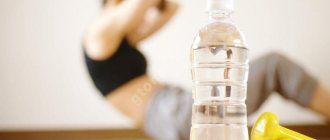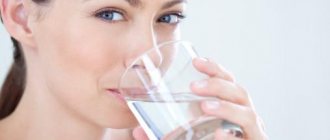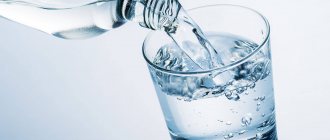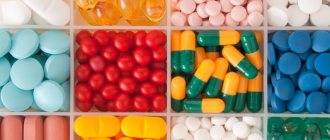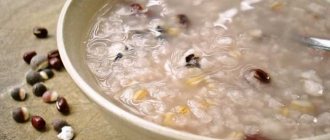Water is a liquid that is essential for our existence. Due to such importance, it has gathered many questions around it. How much do you need to drink per day, what time of day is it better to drink and what benefits does water have for our body in general? Does it have any negative characteristics? We will provide answers to the most pressing questions. But first, let’s answer why you need to drink water.
The role of water in the human body
Even from school, we remember information about what percentage of a person consists of water. It is worth paying attention that the amount of liquid fluctuates, depending on several factors: age, condition of internal organs, human health. As we all remember, the percentage of water in the human body is 60–80 percent. Thanks to water, the body is able to do its job correctly. Namely:
- supply of nutrients to all organs;
- providing oxygen to the lungs;
- maintaining heart function;
- release of processed substances;
- ensuring stability of the internal environment;
- maintaining temperature within normal limits;
- maintaining an immune system that can resist disease.
This information provides a clear answer to the question “why drink water” and demonstrates the importance of this event.
Is it true that not drinking enough water can cause headaches?
Headache - drink water! This is not just a statement. In fact, lack of water causes a person to experience headache attacks. Even with mild dehydration, the brain slows down its reactions. The thing is that brain cells in their composition include more than 80 percent water. In addition, the brain is washed by a fifth of the body's blood. In addition to this, brain cells are also affected by cerebrospinal fluid.
Together with the fluid, the brain receives important “products” - oxygen and glucose. It is these two components that directly affect the state of the nervous system. And most importantly, water removes toxins and other “harmful” substances from brain cells that should not remain in the brain.
If the body does not receive enough fluid, then headaches will be accompanied by the following unpleasant events:
- fast fatiguability;
- poor memory performance;
- slowing down the execution of actions;
- increased nervousness.
If you can confidently say that I drink a lot of water, then you are not afraid of headaches (at least from dehydration). Drinking water is especially recommended for those who engage in active mental work during the day to improve well-being and increase activity.
What will happen to a person if he drinks only water, without food?
In the first days of fasting, the body begins to use hidden energy reserves from fat and muscle tissue.
But soon the person’s skin turns pale, and an unpleasant odor appears from the mouth. There is a loss of strength and severe headaches .
But at first there is no serious threat to the body. After about 3-4 days, the feeling of hunger subsides, and the body begins to produce ketones, which are harmful in large quantities.
A person can live without food for more than a month, provided there is drinking . But without water, the body is not able to survive for three days. Read more here.
I drink little water - what will happen? Is it dangerous or not?
Many people underestimate the importance and do not understand why you need to drink a lot of water. Let’s give an illustrative example and answer the question of what will happen if there is insufficient fluid intake. In addition to the headache, as already described above, many other unpleasant symptoms will appear, which in the future (if the situation is not changed) can even lead to a dangerous disease. First of all, with insufficient drinking, the digestive and excretory systems suffer. The stomach and intestines will not perform their “functionality” without fluid. It is water that promotes normal digestion of food and also carries out the process of absorption of nutrients from the intestines. Lack of water will soon lead to disorders such as constipation, a feeling of heaviness in the abdomen and other painful sensations.
Kidney function is also affected. With insufficient drinking, filtration capacity deteriorates significantly. As a result, various kidney diseases occur. Having diagnosed such deterioration in the body, doctors prescribe plenty of daily drinking of water. The minimum volume of fluid that a person should consume for normal kidney function is more than one and a half liters of water.
“Water-dwellers” versus “desert dwellers”
For normal functioning of the body and good health, an ordinary adult needs to consume about 3 liters of fluid per day. These can be soups and compotes, juices and lemonade, but pure water should be 1-1.5 liters. With intense physical activity or, conversely, lack thereof, and with changing climatic conditions, these numbers may vary. But doctors, nutritionists and sports trainers tend to convince people to comply with this condition every day.
Calculations regarding the volume of fluid required by the body daily have been carried out by scientists with mathematical precision.
It has been proven that to break down food, activate metabolic processes and remove toxins from the body, along with sweat and urine, you need to drink about 1 liter of ordinary water.
But, as practice shows, every third inhabitant of the planet does not fulfill this condition for various reasons. There is a certain group of people who do not need fluids and feel great without water for hours. They consume no more than 0.5-0.7 liters per day, and an increase in volume causes them discomfort. It is expressed in intense sweating and frequent urge to urinate. Therefore, “hermits,” as experts often call such people, refuse to drink even in the gym.
Don't miss: Which water is better to drink - boiled or raw?
The second category of people, on the contrary, cannot live without water; their daily fluid consumption reaches 4-5 liters. It’s easy to spot such “water drinkers” in a crowd: they always have a bottle of drinking water at any time of the year. These people, on the contrary, feel comfortable when their stomach is at least a third full of liquid, and often ignore the side effects of profuse sweating. However, the human body is a unique self-regulating system, so soon the signs of its oversaturation with moisture disappear. But the question remains: to drink or not to drink?
If I don't drink enough, will it affect my appearance?
It will appear and not in a good way. Why drink a lot of water? To look good not only at a young age, but also at an old age.
The famous medieval Persian scientist and doctor Avicenna said that old age is a dryness of the body and, first of all, the skin. With sufficient water intake, the skin is capable of effectively performing its protective abilities, namely, maintaining and maintaining elasticity and firmness. It is very important to drink enough during periods when the skin is exposed to sunlight, wind or low temperatures. If you drink well, these factors will not have a negative effect on the skin. Otherwise (if you drink little water) the skin will be susceptible to various “defects”. In addition, it has been noted that in people who drink insufficient amounts of fluid, wrinkles on the skin appear earlier. This is explained by the fact that healthy skin contains 25 percent water. When this indicator decreases, wrinkles appear as a consequence. To ensure your skin always looks healthy and beautiful, drink at least 2 liters of water per day.
Therefore, always follow the rule - I drink a lot of water, which means I will be healthy, beautiful and active.
Consequences of dehydration
Finally, I will tell you what happens to your body when there is a lack of moisture. Imagine that breathing alone takes up 0.5 liters per day. And if a person also plays sports or has physical activity, then it reaches up to one liter. What if he only uses one liter a day? Then breathing will be complicated, his muscles will not be in good shape, the skin will be flabby, even the pressure may decrease, and the worst thing, no, not obesity, but even worse - the formation of blood clots, which tend to break off, which can lead to death. The functioning of the liver, kidneys and heart further deteriorates, the efficiency of brain activity decreases, and hallucinations may even occur.
Popular myths about drinking water
There is a flood of information on the Internet, on forums and from other information sources regarding the use of water. Namely, that in some cases and in certain circumstances water causes harm. Let's dispel the most basic of them.
- If you drink a lot of water, there will be swelling. The appearance of edema in most cases is not provoked by drinking water. On the contrary, if a person with edema reduces the amount of fluid consumed, the condition will worsen.
- The second common myth is that after eating you need to drink a glass of water. Many people live by this principle and think about the benefits of this event. In fact, gastroenterologists do not recommend drinking large quantities of water immediately after meals, as this reduces the concentration of hydrochloric acid. It is better to drink some time after the meal.
- The third popular myth is that if you drink water at night, there will be swelling and poor sleep. On the contrary, a glass of water in the evening promotes healthy and sound sleep, and will also have a positive effect on your morning state.
Reasons for the presence and absence of thirst
It happens that a person is constantly thirsty or does not feel thirsty at all . The reasons for such conditions are worth considering.
I want it often and a lot
Thirst is often a signal that the body is dehydrated. Typically, a person experiences this condition after diarrhea, blood loss, overheating, or playing sports.
This symptom is possible for other health-related reasons:
- diabetes;
- hyperparathyroidism (increased levels of hormones produced by the parathyroid glands);
- failure of the kidneys or liver.
Sometimes a person constantly wants to drink without specific reasons. Then you need to change your diet and lifestyle. For example, thirst increases if you quench it with sweet soda or beer.
You also feel more thirsty in the following cases:
- after eating smoked meats, pickles, canned food, fatty foods;
- taking a number of medications, in particular antibiotics;
- stressful situations;
- pregnancy period.
If you experience unreasonable thirst and drink more than 5 liters of water per day, you should definitely consult a doctor. Read more here.
There is no need at all
If a person does not feel thirsty at all, then this is not a sign of a lack of need for water in the body. In this situation, you should be wary.
Reluctance to drink water may be caused by impaired kidney function or weakened transmission of nerve impulses in cells (the brain does not send the appropriate signal).
For some people, their daily diet is dominated by liquid foods, fresh fruits and vegetables . Therefore, they do not have a special craving for water. Only drinks such as milk, tea and coffee, juices are food, and the body requires clean water. Details are in this article.
What kind of water to drink
This question is no less relevant than the previous ones. Every person has a choice of what kind of water to drink. This can be liquid from the tap, from a cooler, from a private well, filtered. Why is this question so important? The quality and composition of water directly affects human well-being and health. Therefore, in order for water to fulfill its purpose and bring benefits, it is necessary to give preference to a liquid that has been filtered.
Now filters for drinking water purification are a common household item. Considering the poor quality of water, this system is an urgent need. Among the varieties: main filters for domestic water, jug filters, reverse osmosis systems and other types. Ecosoft filter products are widespread in Ukraine, so there will be no problems purchasing the desired equipment. This is not an expensive undertaking at all, since the prices for Ecosoft filters are quite affordable. All you need to remember when operating such equipment is to change cartridge cassettes on time. By the way, prices for Ecosoft cartridges are on a low price threshold.
Therefore, if you want to get full benefits from water, but you don’t have a filter device yet, it’s time to choose the appropriate type of system and install it. Prices for Ecosoft osmosis and other types have a favorable relationship to the quality of the products. Installing any filter will allow you to always have clean water in the right quantities.
Correct technique
In order for the body to work smoothly, it is necessary to properly build a drinking regime . Here are some important recommendations from nutritionists:
Type
When choosing water for daily drinking, immediately exclude the one from the tap (unpurified). It contains many harmful inclusions, in particular chlorine, which is used for disinfection.
And the calcium carbonate present in tap water damages the kidneys. Untreated water is poorly absorbed by the body and causes edema.
Preference should be given to bottled water. Pay attention to its composition, especially the amount of minerals: less than 500 mg per 1 liter - you can drink it daily, above - drink as prescribed by a doctor.
Calcium-containing water is indicated as a preventative against osteoporosis . If you have digestive problems, it is recommended to stick to water saturated with sulfur (contraindicated for children).
Water with chlorine has a beneficial effect on the intestines, bile ducts and liver. But you can’t drink it if your blood pressure is consistently high. Magnesium water is recommended for constipation and stress, but is contraindicated for stomach diseases.
Carbonated or still?
Nutrition experts do not recommend drinking sparkling water often or in large quantities, as it increases hunger.
Once in the stomach, it activates food receptors and gastric juice begins to be intensively produced. It also flushes calcium from the body .
The advantage of this water is its antibacterial properties. It is better to drink still water on a regular basis with rare deviations from the rules.
Dosage per day
There are still no exact standards for the amount of water consumed per day. But, it is recommended (which also includes soups and various drinks) to do it based on your own weight: per 1 kg - 30 ml.
Approximate daily values for different people are presented in the table:
| Adults | Men – 2.5 l, women – 2 l. |
| Infants | 100-200 ml |
| Children aged 2-7 years | 1-1.6 l |
| Pregnant | 2.3 l |
| When breastfeeding | 2.6 l |
When to drink more water:
- pregnant women, if there is no predisposition to edema;
- while breastfeeding, since during this period the body loses a lot of water;
- in persistently hot weather;
- in case of systematic physical overload;
- for a number of diseases caused by metabolic disorders: diabetes, gout.
How often and how exactly is it necessary?
Many people make the mistake of not drinking until they feel thirsty. The standby mode is contraindicated for the body, since dry mouth is the first sign of dehydration.
You need to drink a little bit throughout the day . If you cannot immediately drink the required amount of water per day, then it is recommended to accustom yourself to drinking by the hour (like taking medicine).
It is not advisable to drink while eating, especially for lovers of pickles, spices and baked goods. Water dilutes gastric juice, thereby slowing down the digestive process.
When it is impossible to give up the habit of drinking, then preference is given to unsweetened carbonated water - it quenches thirst faster and speeds up digestion.
Some more useful tips:
- immediately after waking up, you need to drink a glass of clean water, which puts all your organs into action;
- water should be at room temperature – cold water slows down metabolic processes and contributes to obesity;
- drink in small sips and slowly, which facilitates the functioning of the kidneys;
- Before sports training, you should not drink a lot of water in one gulp and immediately go to work - you should take a little water into your mouth, hold it and swallow slowly, then wait a few seconds.
How to start?
A number of recommendations to help you train yourself to drink water:
add different fruits to the water for taste;- keep daily records of water consumed, recording data on paper or in a special mobile phone program;
- always take a bottle of water with you so you can drink it outside the home;
- in case of hunger, first drink some water (this will allow you to understand what the body is asking for - food or drink);
- active drinking regime is stopped after 19-00;
- do not drink water immediately after eating, but 1-1.5 hours later - give the body the opportunity to join the digestive process;
- Every 30 minutes they take a break from work and take a sip of water.
To remember about water, it is recommended to set a reminder on your phone or write it on paper and attach it in a visible place.
Drink water without haste and in small sips: after waking up - about 1 liter, 40 minutes before meals and 1.5 hours after it. In this way, you can protect yourself from many ailments and cure existing ones.
On empty stomach
In the morning, before you have had breakfast, you should definitely drink a glass of clean, warm water. This is a key rule for maintaining water balance in the body. This is because dehydration occurs during a night's rest, and with water drunk in the morning, a person receives a supply of energy for the whole day.
What does drinking water on an empty stomach do?:
helps cleanse the intestines of food debris and mucus;- removes waste and toxins, which has a positive effect on the skin;
- promotes the destruction of fat by accelerating metabolism;
- triggers chemical processes that stimulate cell restoration and also cleanses the blood;
- normalizes the functionality of the lymphatic system, which is responsible for immunity.
Those who want to lose weight should acidify the water with lemon in the morning. In addition to the fact that this citrus promotes fat burning, it has an antibacterial effect.
During the day
How to drink water throughout the day :
- start the day by drinking water on an empty stomach;
- drink water no later than 30 minutes before the next meal and 2 hours after;
- in between meals, they focus on their feelings - if they want, they drink.
Read about how to drink water throughout the day here.

